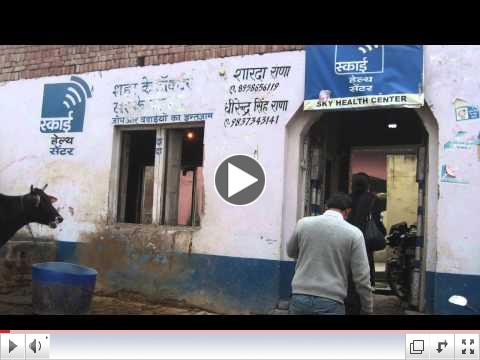|
November 1, 2011
Subscribe
Archive
|
|
Greetings!
DGHI aims to be at the cutting edge of global health education, training, research, policy and service. This includes the innovative and creative delivery of coursework and interactions with faculty and experts across the globe. Watch our latest video, which highlights a recent encounter Global Health Focus students had with their professor while he was traveling in China. Let us know what you think! Closer to home, we hope to see you tomorrow (Wednesday) for an interesting and lively talk by visiting professor from the London School of Hygiene and Tropical Medicine, Sanjay Kinra. Dr. Kinra will be at DGHI through early 2012. Don't miss this opportunity to hear from him at noon tomorrow in Trent 040. He's looking to form collaborations with Duke faculty and students so I hope to see you there. Duke Faculty: The Duke Office of the Vice Provost for Interdisciplinary Studies has issued a request for proposals for Problem-Focused Interdisciplinary Research-Scholarship Teams (PFIRST). Up to $150,000 will be awarded to faculty groups to organize research collaborations that engage societal issues through multiple disciplinary approaches. The deadline for proposals is January 9, 2012. Until next week, Geelea Seaford and Everyo ne at DGHI
P.S. Thanks to everyone who came out to the DGHI Halloween party, and congratulations to all our costume contest winners! See photos from the event.
|
|
|
| Upcoming Events |
Pregnancy Undernutrition, Urban Migration, and Yoga: Tales of Cardiovascular Research from India
Nov. 2, 12-1 pm
Labor Economics Seminar: "Price Subsidies, Diagnostic Tests, and Targeting of Malaria Treatment"
Nov. 2, 3:30-5 pm
Health Care Financing and Reform: China and the United States 2011
Nov. 3, 1-7 pm
Global Health Journal Club: Clean Water - A Forgotten Global Health Priority?
Nov. 8, 12-1 pm
Introduction to GIS and Global Health
Nov. 8, 4-5 pm
Global Health Exchange: Ann Buchanan
Nov. 9, 12-1 pm
See all events
|
|
|
Going Global Using Technology
David Boyd, DGHI professor of the practice, is among a growing cadre of global health faculty to use Skype and multimedia recording technologies to enhance their teaching, host guest speakers and connect live with international partners.  | |
Click the image to watch video
|
In his role as DGHI Faculty Director for International Education, Boyd spent two weeks in China to meet with international partners and research collaborators in Beijing, Hong Kong, Kunshan, Guangzhou and Shanghai. While away, Boyd worked with DGHI Educational Technologies Consultant Marc Sperber and Global Health Librarian Diane Harvey to coordinate the research and technology setup required for a student global health project in his Vulnerable Populations and Global Health class. Other DGHI faculty to use technology for class and to connect with partners internationally include John Bartlett, Chris Woods and Manoj Mohanan. In the future, DGHI envisions that Duke faculty and students will continue to expand the boundaries for using technology to engage faculty, students and partners around the world. These innovative and interactive global health learning environments will not only benefit students here, but connect them with the rest of the world. Watch the new video to the right to learn more about Dr. Boyd's classroom exercise while he was away, and hear from the students in his class.
|
|
|
Research Explores Spread of Cholera in Caribbean in 19th Century
DGHI affiliate Deborah Jenson, professor of romance studies who co-directs the Duke Haiti Humanities Lab, published a new article with student researchers in the November issue of Emerging Infectious Diseases which  explores the presence and spread of Cholera in the Caribbean Islands throughout history. explores the presence and spread of Cholera in the Caribbean Islands throughout history.
Medical journals and other sources do not show evidence that cholera occurred in Haiti before 2010, despite the devastating effect of this disease in the Caribbean region in the 19th century.
The Caribbean region experienced cholera in 3 major waves: 1833-1834, 1850-1856 and 1865-1872. In the 3 pandemics that involved the Caribbean in the 19th century, Jenson and the Haiti Lab team found no medical or lay reports of cholera in Haiti, the Netherlands Antilles of Aruba, Bonaire, and Curaçao; the Cayman Islands; and St. Martin, St. Barthélemy, or Montserrat. Of these sites, Haiti is the largest and most densely populated and was a close neighbor of hard-hit Cuba and Jamaica.
Conditions associated with slavery and colonial military control were absent in independent Haiti. In other locations of the Caribbean, clustered populations, regular influx of new persons, and close quarters of barracks living contributed to spread of cholera. In the article, Jenson and Haiti Lab student researchers provide historical accounts of the presence and spread of cholera epidemics in Caribbean islands.
Historical Context for Cholera in Haiti
Although it is difficult to confirm the absence of a disease in an earlier era, this report explores textual evidence for the immunologic status of persons to cholera in Haiti reported in scientific journals and lay journalism sources from the 19th century. It also considers the reasons that epidemic cholera failed to occur in Haiti in the 19th century even though it did affect many neighboring environments, including the Dominican Republic.

|
| |
Global Health Researcher Addresses Cervical Cancer Screening in Kenya
By Joy Ogunmuyiwa
Despite remarkable progress made in reducing the incidence of cervical cancer in many countries, globally, it remains the second most common cancer among women. However, recent advancements have allowed individuals to fight a smarter war against cervical cancer, tracing their success to the availability of trained clinicians, modern laboratories that target women at a higher risk of contracting cervical cancer, and researchers like Erin Dainty.
Dainty, an OB/GYN fellow in the Duke Global Health Residency/Fellowship Pathway and Master of Science in Global Health student, gave a lunchtime talk at the Duke Global Health Institute on Friday. Her work targets HIV positive women in Kenya, where cervical cancer
 has the highest incidence of any malignancy and fewer than 5% of Kenyan women get screened for it. has the highest incidence of any malignancy and fewer than 5% of Kenyan women get screened for it.
Through a recently awarded Fogarty International Clinical Research Fellowship, Dainty aims to assess the impact of HIV and geographic location on human papillomavirus (HPV). HIV-infected women in regions, such as Africa, appear to be infected with less prevalent types of HPV, specifically those that cause invasive cervical cancer. This fact makes studying HPV genotyping distribution in HIV-infected Kenyan women even more important.
Part of Dainty's work explores the development of effective screening programs in Eldoret and surrounding areas. Dainty plans to incorporate HPV genotyping into the screening and treatment process in Western Kenya, tailor treatment models, and build local capacity for molecular diagnostics.
During the talk, Dainty said a challenge of her clinical research will be the social implications of HPV and cervical cancer screening and diagnosis.

|
| | | | |
|
|
|
|
 | |
Click the image to watch video
|
Evaluating Telemedicine: An Interview with Manoj Mohanan
What is Telemedicine? How can we evaluate it? Assistant Professor of Public Policy and Global Health Manoj Mohanan is looking at telemedicine facilities in Bihar, India in a project that includes both the Duke Global Health Institute and the Bill & Melinda Gates Foundation.
Mohanan works with small armies of researchers who conduct surveys, crunch numbers and analyze large quantities of data to determine if a given health care policy is effective, and why. Mohanan's current research projects include development of innovative methods to measure quality of care in primary care, impact evaluation of large public sector subsidy programs, experimental evaluation of provider incentives, evaluation of social franchising models, and estimating the effect of quality information on provider choice. DGHI Adjunct Prof. Muhammad Ali Pate Receives Nod as Nigerian Minister of State for Health From the ANPA Blog The name Muhammad Ali Pate has "haunted" me throughout my time at Duke University. Whenever I discuss my  intentions to return to Nigeria at some point in my medical career, I am faced with the question, "have you met Dr. Pate?" Given my workload, I continually postponed plans to request an audience with him, a delay that would ultimately prove costly as Dr. Pate - recently appointed Nigerian Minister of State for Health - will now be even harder to get a hold of than he was a few months ago. intentions to return to Nigeria at some point in my medical career, I am faced with the question, "have you met Dr. Pate?" Given my workload, I continually postponed plans to request an audience with him, a delay that would ultimately prove costly as Dr. Pate - recently appointed Nigerian Minister of State for Health - will now be even harder to get a hold of than he was a few months ago. Dr. Pate's already illustrious career encompasses service with the World Bank, with the World Health Organization, with the Nigerian National Primary Health Care Development Agency and with the Midwives Service Scheme. Locally (in Durham), he has played a prominent role in the development of the Duke Global Health Institute. Given his remarkable experience and solid track record, there is no doubt that Dr. Pate is well poised to serve as a catalyst for progress in the Nigerian health sector. 
|
|
|
| Received this as a forward? Sign up for future issues.
|
|
|
|
|
|